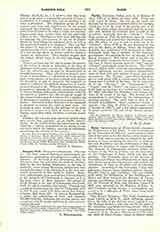

Parini, GIUSEPPE, Italian poet, b. at Bosisio, May 23, 1729; d. at Milan, August 15, 1799. Parini was early taken to Milan. He was an apt pupil and showed that he possessed marked ability for teaching, which was to be the work of the greater part of his life. His poetic talent also evinced itself at an early date and secured his entrance into several of the Accademie, especially into the “Arcadia”. Taking Holy orders in 1754, he served as tutor in several noble families and gained that knowledge of fashionable life which he was to put to good use in his “Giorno”. From 1773 on he was professor of fine arts in the Brera at Milan. When the Cisalpine Republic was established with its capital at Milan, Bonaparte made him a member of the municipal government; this position he lost on account of his liberal utterances. The latter part of his life was passed in rather straitened circumstances. The poetical fame of Parini depends upon his “Odi” and the “Giorno”, particularly upon the latter. The “Odi” (Ist ed., Milan, 1791) are in the conventional manner of the eighteenth century Arcadian compositions; some of them deal with matters of moral and social speculation. The “Giorno”, upon which he had begun to work about 1760, is a satire upon the life of the young man of fashion of the time. In the four parts of it—the “Mattino”, the “Mezzogiorno”, the “Vespro”, and the “Notte”—he passes in review the futile daily occupations of a typical society beau, all the while ridiculing the effeminate and corrupt customs of the youth of the age. The interest of the composition is diversified by the introduction of pleasing episodes. The verse form is that of unrhymed decasyllables. Some occasional verses, a cantata (“La figlia di Jefte”), a dramatic work (“Ascanio in Alba”), and a few minor compositions in prose constitute the rest of his literary productions.
J. D. M. FORD

